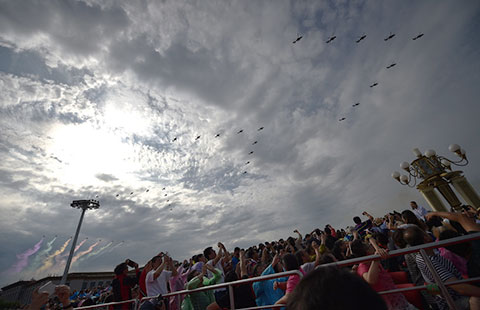Navy stages live-ammo drill in S. China Sea
By Zhao Lei (China Daily) Updated: 2015-08-03 07:36
The People's Liberation Army navy conducted its largest ever live-ammunition drill in the South China Sea last week, Chinese media reported.
The exercise involved more than 100 naval vessels, dozens of aircraft and a number of electronic warfare units in a sophisticated electronic warfare scenario, PLA Daily reported. The PLA's Second Artillery Corps, which operates China's strategic and cruise missiles, also sent several battalions to Tuesday's drill.
Video from China Central Television showed the PLA mobilized some of its most advanced weapons during the drill, including the J-11 fighter jet and Type-054 frigate.
Dozens of missiles and torpedoes and thousands of cannon shells and bombs were fired during the exercise, the newspaper reported.
The drill tested the PLA navy's air defense and early warning system and improved its emergency response capability, sources with the navy said.
PLA Daily quoted an unidentified officer of the navy's training department as saying that the exercise was the largest drill the navy has ever conducted. The officer said the navy tested several defense maneuvers, including surface ship countermeasures against supersonic anti-ship missiles.
"By adopting various threat scenarios and realistic combat simulations, the exercise was as sophisticated as an actual operation, effectively examining the real performance of the navy's new weapons and improving our capability for joint operation," said commanders of the navy's South Sea Fleet.
Zhang Junshe, a senior researcher from the PLA Naval Military Studies Research Institute, told China Daily the drill indicated the PLA navy had made huge strides in forging a strong anti-submarine capability.
A highlight of the drill was the evidence the navy now has countermeasures against supersonic anti-ship missiles, he said.
"Such an exercise combines powers from the navy, the air force and the missile units, and would enable the navy to gain realistic experience of modern maritime warfare," Zhang said.
Li Li, a military technology professor at PLA National Defense University, told China Central Television that a typical navy drill usually involves fewer than 10 ships, so the scale of the latest exercise was rare.
She said the drill was aimed at simulating a mid-scale, regional conflict and helped military personnel gain familiarity with new weapons and new tactics.
In addition, the participation of missile units reminded those who might want to confront China in the South China Sea that they will face formidable missile strength, Li said.
Senior Captain Liang Yang, spokesman for the navy, said the recent exercises are in line with international laws and practices, and the PLA navy will continue to hold similar drills.
The navy will remain on high alert and stay fully prepared to fulfill missions, safeguard national sovereignty, security and interests, and ensure regional peace and stability, Liang said.
zhaolei@chinadaily.com.cn
- Delegation salutes Tibet anniversary
- Officials are told to act as anti-graft watchdogs
- Great Wall safeguarded in united action
- Vice minister pledges more efforts to improve air quality
- Beijing’s efforts to control air pollution start to pay off
- China's military committed to reform
- Netizens rip singer over baby photos
- Central govt's growing support for Tibet
- Monument to be built on Tianjin blast site
- China and Russia seal raft of energy deals







